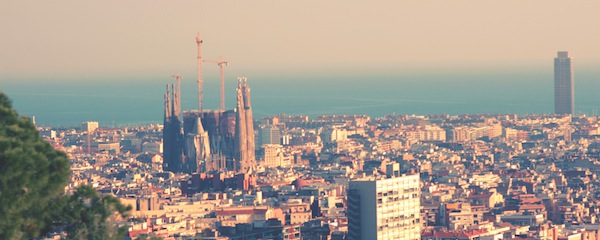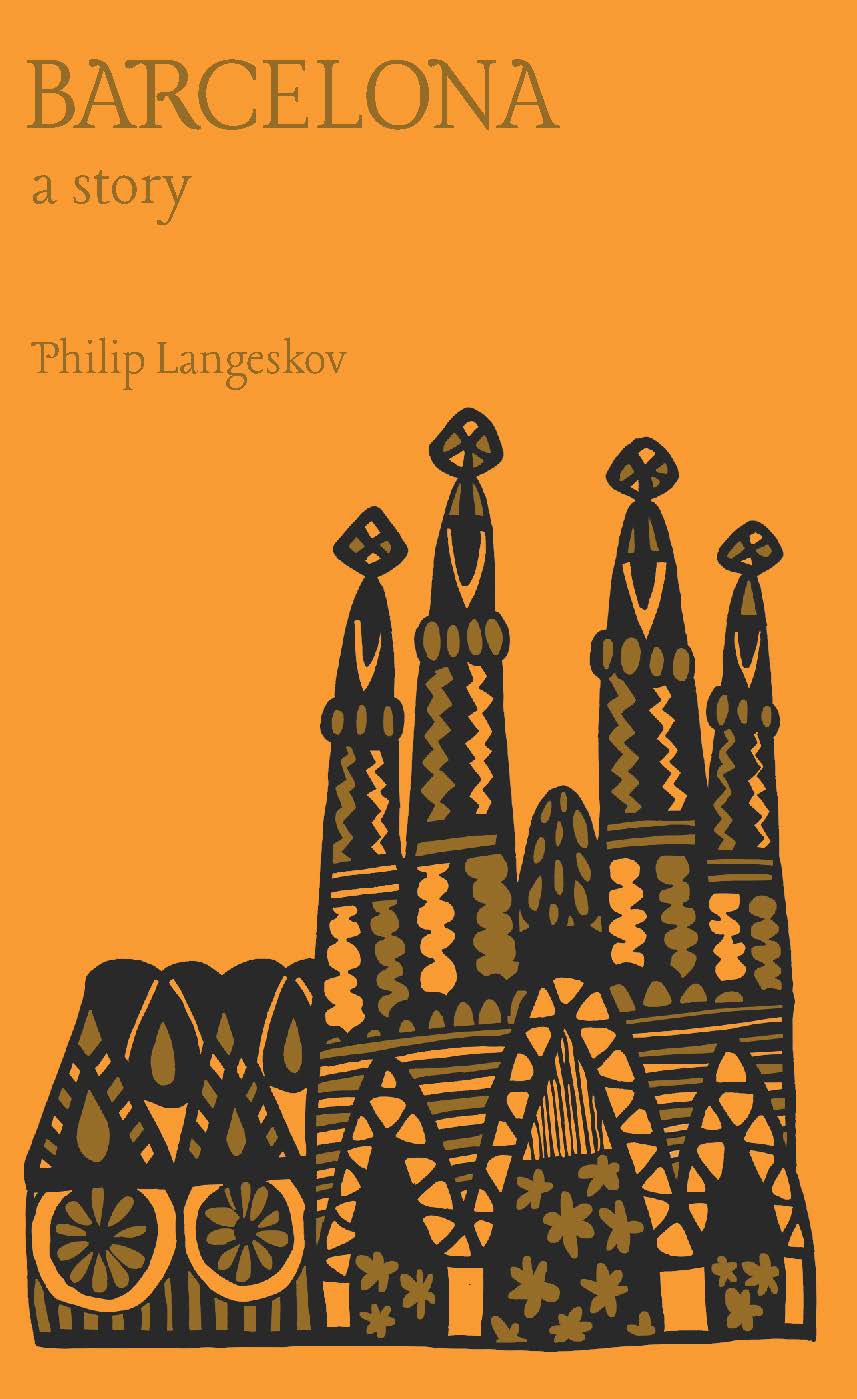
photo by ddanielbe
by Hannah Radcliffe
We’ve all experienced the feeling that the world is somehow conspiring against us; that someone, somewhere is tugging gently (or not so gently) on the strings of fate, sending us seemingly off-kilter. An alarm clock that doesn’t go off, which leads to a missed bus, which leads to a missed train on the morning you absolutely have to be at work early. When it comes to our destinies, where do we draw the line between fate and free will?
Barcelona, by Philip Langeskov, is a short story steeped in the mystery of fate and the idea of the ‘road not travelled’. It is the story of Daniel, who has the idea that he and his wife, Isla, should re-visit Barcelona, where they spent their honeymoon. Daniel has decided to plan a surprise trip that will coincide with their tenth wedding anniversary. ‘The idea struck him…and it immediately felt like an important thing to do.’ Such is the last-minute nature of his decision that Daniel is left with no choice but to begrudgingly enlist the help of Josep, a former ‘fling’ of Isla’s and a native of Barcelona, who agrees to let them use his apartment for the weekend. All seems to be going well until, when presented with the idea of a surprise weekend away, Isla announces that she’s supposed to be at a conference – an event that Daniel would have seen clearly marked on their calendar, had he checked it properly.
Isla goes out for the evening to meet a friend, leaving Daniel to ruminate on his thwarted trip. Faced with the possibility of having to postpone, the weekend away starts to take on a disproportionate sense of gravitas:
The importance of the weekend, the value he had attached to it in his mind, swirled around him. From his perspective, he knew, its significance had become outlandishly inflated. It was, after all, only a couple of days, but to Daniel those days had come to seem possessed of a precipitous, life-altering power.
 It begins to seem that Daniel’s plans have been heavy with portent from their very inception. It’s as though there’s something gathering at the edges of this story that we can’t quite put our finger on, a deft drip-feed by Langeskov of the nagging sense of conspiracy. A momentum, of sorts, that we the reader can sense, but are powerless to affect. When Isla returns home later that evening it is to reveal a change of heart. As she speaks – “No. You were right. We should go at the weekend. It’s our wedding anniversary” – we feel a sense of relief for Daniel, coupled with a tinge of foreboding. With this emphasis on the ‘life altering’ nature of the weekend, Langeskov has adroitly ramped-up the attention we would normally pay to such a detail and has, within the space of a few pages, managed to weave us tightly into the fabric of his story.
It begins to seem that Daniel’s plans have been heavy with portent from their very inception. It’s as though there’s something gathering at the edges of this story that we can’t quite put our finger on, a deft drip-feed by Langeskov of the nagging sense of conspiracy. A momentum, of sorts, that we the reader can sense, but are powerless to affect. When Isla returns home later that evening it is to reveal a change of heart. As she speaks – “No. You were right. We should go at the weekend. It’s our wedding anniversary” – we feel a sense of relief for Daniel, coupled with a tinge of foreboding. With this emphasis on the ‘life altering’ nature of the weekend, Langeskov has adroitly ramped-up the attention we would normally pay to such a detail and has, within the space of a few pages, managed to weave us tightly into the fabric of his story.
On the plane, Daniel reads a short story by Graham Greene called ‘The Overnight Bag’. He’s had the anthology for a while and the need to return it to the friend he borrowed it from has been weighing on his mind. The story is about a man called Henry Cooper, who, much like Daniel, is taking a plane journey. Henry Cooper is travelling from Nice to London, and he’s carrying an overnight bag. Nothing particularly unusual or interesting about that – until Henry Cooper reveals to a fellow traveller that the bag, in fact, contains the body of a dead baby. A controversial and macabre cargo. Once in London, Henry Cooper leaves the airport and tells his cab driver the same story: he has the body of his wife’s dead baby in his bag. On reaching home he puts on his slippers, makes chit-chat with his mother and when she leaves the room to start preparing their dinner, he decides it must be time to unpack. Here the story ends, with no further mention of a dead child, explanation or conclusion. Daniel is perturbed by this abrupt, unresolved ending to the story. It weighs heavily on his mind:
He thought about the story. It troubled him, made him uneasy. He couldn’t have said precisely why it troubled him, even to himself, but already, as they made their descent into Barcelona, swinging wide over the city lit against the dusk, it preoccupied him to an unusual degree.
The use of ‘The Overnight Bag’ as a device is a master-stroke. Langeskov allows the atmosphere of Greene’s short story to permeate the layers of his own writing. The unsettling tone of the piece sits in the back of Daniel’s mind, tainting his every experience. The whole notion of the trip seems affected by it and ‘he wished he’d never read the story, wished he had never picked the book up from the hall table, wished Steve had never loaned it to him’. The unease sets in.
In the baggage lounge, Daniel and Isla stand around with their fellow travellers, waiting for their luggage to arrive. Daniel considers the duplicitous nature of Henry Cooper. It gets under his skin, this idea that Cooper could deliberately mislead, deliberately fabricate a story.
He couldn’t think why it bothered him particularly now, except to say that it was suddenly as if he had been introduced to a certain quality in himself that either he had not known about or had chosen to ignore or worked hard to suppress.
By placing this particular story within his story, Langeskov creates the perfect framework to allow his character, Daniel, to touch upon elements of his own personality that make him uneasy. Daniel almost seems to fear Henry Cooper’s duplicitous character, and yet he himself is guilty of deceit, even if it is with the best intentions. Daniel is seeking to create a ‘version’ of himself and his relationship in  Barcelona, he is trying to recapture a feeling, a sensation that has been lost. Much like Henry Cooper, Daniel is fabricating a version of himself.
Barcelona, he is trying to recapture a feeling, a sensation that has been lost. Much like Henry Cooper, Daniel is fabricating a version of himself.
Meanwhile, the couple’s bags don’t arrive. Their fellow travellers collect suitcases around them, setting out on the next stages of their journey, as Daniel and Isla seem trapped in the strange liminal ground of the airport terminal. Once again, we’re faced with that feeling of conspiracy; the almost aborted trip, the sense of unease on the plane, Daniel’s obsession with the story of Henry Cooper, the absence of the precious suitcase which will signal their freedom from the airport and the beginning of their holiday. Are these the warning signs that tell us we’re treading the wrong path? Or perhaps it is, in fact, just an example of the obstacles life seems to throw up on a day to day basis. Is fate or free will at play here?
Finally the suitcase rolls onto the baggage carousel, and the sense of foreboding begins to lift. Their trip can go ahead, the baggage was simply delayed, there is no malice in that. Daniel and Isla venture out into Barcelona. As a reader, you can almost start to relax, start to decide that, yes, this is normal; things can go wrong with the best laid plans.
They strolled arm in arm through the evening crowds and Daniel at last felt the pleasant lassitude of heat and travel. This was what he had wanted from the outset: to be walking these streets, at this hour, with Isla at his side.
However, shortly after arriving in Barcelona, Isla is taken ill. A doctor is called to Josep’s apartment and once again Langeskov begins to play with the feeling that, somehow, all of these obstacles were set in motion before Daniel and Isla ever set foot on the plane. We have a series of tiny little movements that seem to expand like ripples on water: Daniel’s last-minute planning, Isla’s reluctance to go in the first place, his reading of Graham Greene’s unsettling story. All of these obstacles seem to focus Daniel’s attention on Isla, as though it is only with each small conspiracy that he is able to understand what it is she means to him:
This was the lesson of ten years of marriage: to be without her would be unbearable, like falling of a cliff and finding himself at the bottom looking up.
In order to find out what happens to Daniel and Isla, you will have to read the story for yourselves. I would highly recommend that you do; it’s a twisting, turning, beautifully haunting exploration of love, the fleeting nature of time, hope and destiny. What I will tell you is that Langeskov plays beautifully with the idea of what might have been, if only. His story is peppered with turning points; taking us one way, then leading us another. We as readers can take this haunting, evocative story and decide for ourselves whether there is an inevitability in Daniel and Isla’s story, whether the warning signs were there all along, or whether, in fact, life is simply an absurd journey which we are powerless to control.

